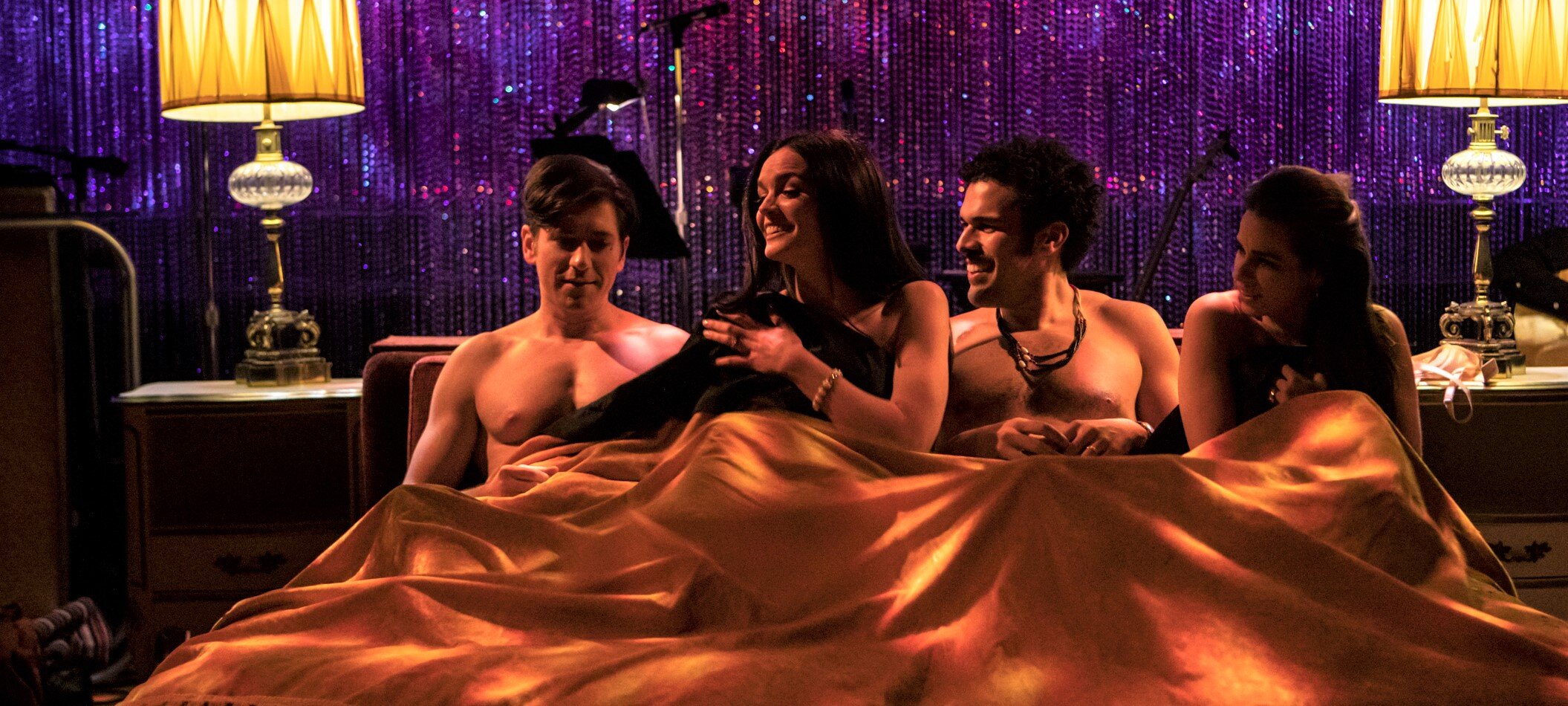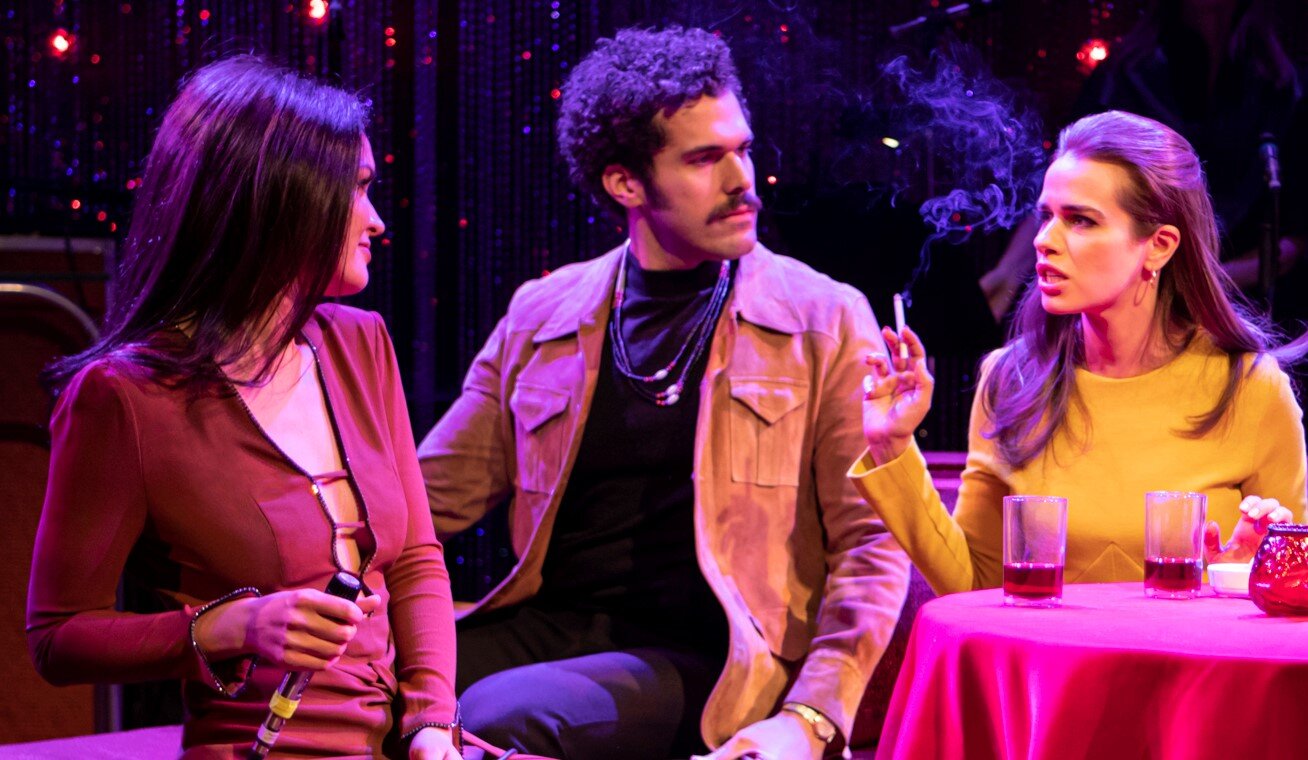Carol (Jennifer Damiano), Bob (Joél Pérez), and Alice (Ana Nogueira), discussing sex, no doubt, in Bob & Carol & Ted & Alice.
How exciting and new the film Bob & Carol & Ted & Alice must have seemed when it hit pre-multiplex screens in 1969. Along with such contemporary classics as Midnight Cowboy and Easy Rider, and with the added inducement of major movie stars wearing few clothes, Paul Mazursky’s satire proffered trendy sex; inspired materialistic adults to question their values; laughed about pot, one of the first big releases to do so; spoofed middle-class mores; and served up newly permissible bare breasts, though not Natalie Wood’s or Dyan Cannon’s. As a time capsule, the movie holds up. But why, in 2020, do a musical version?
It’s a question not sufficiently answered in the New Group’s Bob & Carol & Ted & Alice at the Pershing Square Signature Center, though there are pleasures to be had. Chief among them are Duncan Sheik’s friendly soft-rock melodies, which sound just like what you’d hear if you switched on the AM radio in your ’70 Plymouth Duster. And his lyrics, co-written with Amanda Green, are above the current norm in cleverness and neatness, though they don’t always seem to issue forth naturally from whoever is singing them, and some—particularly those coming from Suzanne Vega, no less, leading an able four-piece band and playing a sort of emcee, among other parts—don’t advance plot or character at all. But it is a fun score.
Nogueira and Damiano hit a pre-disco club.
Jonathan Marc Sherman’s book hews pretty closely to the Mazursky–Larry Tucker screenplay; it’s just more scattershot, less linear. Once again, Bob (Joél Pérez) and Carol (Jennifer Damiano) head to an Esalen-like encounter group in Big Sur, Calif., where they dip into Sixties psychobabble and strive to think less and feel, feel, FEEL more. Their new consciousness is somewhat lost on their straitlaced best friends Ted (Michael Zegen, familiar as Mr. Maisel on The Marvelous Mrs. Maisel) and Alice (Ana Nogueira), the loopiest of the bunch. When Bob confesses to Carol that he philandered on a business trip, it’s the springboard for all that follows, with the couples’ feelings about monogamy shifting, and getting sung about, a lot. The infidelities pile up—and are quickly forgiven, in a way that perhaps is meant to be satiric, but strains credibility—and the penultimate scene has all four in bed together, looking like an early draft of I Love My Wife.
Sixties attitudes and terminology rule, and the struggles of thirtysomething well-to-do Californians to be hip and groovy are good for a fair amount of comic mileage. Pérez, who looks to have been hired for his almost scary resemblance to Elliott Gould, gets Bob’s self-centeredness and self-consciousness right; Damiano has Carol’s calm, and her maddening refusal to become jealous and possessive when she hears about his affair, down pat.
Ted and Alice, however, are less lucky: Zegen registers as bland, but then his dialogue has the least personality, while Nogueira’s Alice seems not amusingly impulsive, as Cannon made her, just inconsistent. She’s uptight, she’s judgmental, she’s uninhibited—it’s not a logical character arc, it’s just whatever emotion is on the next page. It’s unclear whether to blame her, the writing, or Scott Elliott’s direction, which spends most of its time pointing out the infelicities of the era—the “I’m OK, you’re OK” platitudes, the cigarette smoke, the aesthetics.
Pérez and Damiano (reading I’m OK, You’re OK.) Photographs by Monique Carboni.
Derek McLane’s scenic design is awash in Naugahyde and modular furniture, with very 1969 silver beaded curtains upstage, and costume designer Jeff Mahshie goes to town with bell bottoms, turtlenecks, and Scaasi-esque gowns. Jeff Croiter’s lighting is late-’60s harsh, and Jessica Paz’s sound design is unobtrusive. There’s also Kelly Devine’s choreography, mostly the Madison and the Twist.
Did Sherman, Sheik, and Green simply want to go on a nostalgia trip? Did they wish to celebrate how far the sexual revolution has come since the era of Plato’s Retreat, the notorious swingers’ club, and “key parties”? Did they have a trunkful of tunes with lyrics like, “If you groove and the vibe is right”? Bob & Carol & Ted & Alice has beguiling moments, but the old adage that a musical should elevate the emotions of the source material, express things in ways mere dialogue can’t, is not especially well served here. The evening ends inconclusively, with the post-coital four elegantly dressed, looking forward to a night with Tony Bennett, and staring blankly out front while posing the musical question, “What’s Up With Love?” What, indeed?
The New Group production of Bob & Carol & Ted & Alice runs through March 22 at the Pershing Square Signature Center (480 W. 42nd St.). Evening performances are at 7:30 p.m. Sunday, Tuesday, and Wednesday through Friday, and at 8 p.m. Saturday; matinees are at 2 p.m. Wednesday, Saturday and Sunday. Tickets are available by calling (917) 935-4242 or by visiting thenewgroup.org.





